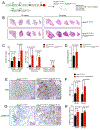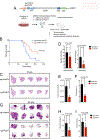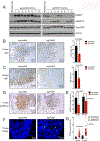Modulation of Mutant KrasG12D -Driven Lung Tumorigenesis In Vivo by Gain or Loss of PCDH7 Function
- PMID: 30409919
- PMCID: PMC6359939
- DOI: 10.1158/1541-7786.MCR-18-0739
Modulation of Mutant KrasG12D -Driven Lung Tumorigenesis In Vivo by Gain or Loss of PCDH7 Function
Abstract
PROTOCADHERIN 7 (PCDH7), a transmembrane receptor and member of the Cadherin superfamily, is frequently overexpressed in lung adenocarcinoma and is associated with poor clinical outcome. Although PCDH7 was recently shown to promote transformation and facilitate brain metastasis in lung and breast cancers, decreased PCDH7 expression has also been documented in colorectal, gastric, and invasive bladder cancers. These data suggest context-dependent functions for PCDH7 in distinct tumor types. Given that PCDH7 is a potentially targetable molecule on the surface of cancer cells, further investigation of its role in tumorigenesis in vivo is needed to evaluate the therapeutic potential of its inhibition. Here, we report the analysis of novel PCDH7 gain- and loss-of-function mouse models and provide compelling evidence that this cell-surface protein acts as a potent lung cancer driver. Employing a Cre-inducible transgenic allele, we demonstrated that enforced PCDH7 expression significantly accelerates KrasG12D -driven lung tumorigenesis and potentiates MAPK pathway activation. Furthermore, we performed in vivo somatic genome editing with CRISPR/Cas9 in KrasLSL-G12D ; Tp53fl/fl (KP) mice to assess the consequences of PCDH7 loss of function. Inactivation of PCDH7 in KP mice significantly reduced lung tumor development, prolonged survival, and diminished phospho-activation of ERK1/2. Together, these findings establish a critical oncogenic function for PCDH7 in vivo and highlight the therapeutic potential of PCDH7 inhibition for lung cancer. Moreover, given recent reports of elevated or reduced PCDH7 in distinct tumor types, the new inducible transgenic model described here provides a robust experimental system for broadly elucidating the effects of PCDH7 overexpression in vivo. IMPLICATIONS: In this study, we establish a critical oncogenic function for PCDH7 in vivo using novel mouse models and CRISPR/Cas9 genome editing, and we validate the therapeutic potential of PCDH7 inhibition for lung cancer.
©2018 American Association for Cancer Research.
Figures




References
-
- Kahr I, Vandepoele K, van Roy F. Delta-protocadherins in health and disease. Progress in molecular biology and translational science 2013;116:169–92. - PubMed
-
- van Roy F Beyond E-cadherin: roles of other cadherin superfamily members in cancer. Nature reviews Cancer 2014;14:121–34. - PubMed
-
- Vincent A, Omura N, Hong SM, Jaffe A, Eshleman J, Goggins M. Genome-wide analysis of promoter methylation associated with gene expression profile in pancreatic adenocarcinoma. Clinical cancer research : an official journal of the American Association for Cancer Research 2011;17:4341–54. - PMC - PubMed
-
- Yang X, Chen MW, Terry S, Vacherot F, Chopin DK, Bemis DL, et al. A human- and male-specific protocadherin that acts through the wnt signaling pathway to induce neuroendocrine transdifferentiation of prostate cancer cells. Cancer research 2005;65:5263–71. - PubMed
Publication types
MeSH terms
Substances
Grants and funding
LinkOut - more resources
Full Text Sources
Medical
Molecular Biology Databases
Research Materials
Miscellaneous

